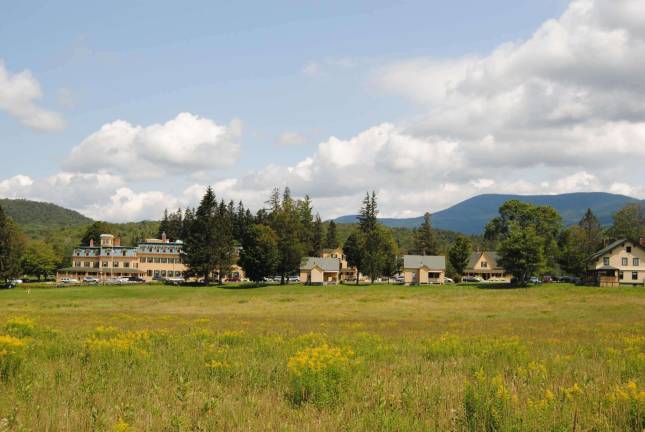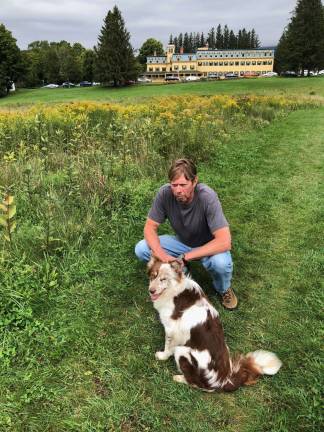Jungian guacamole



What to do when you sell your business but you’re too young to retire? This 52-year-old gets into grad school, adopts an old dog, and finds that studying English can be a bloody sport.
By Ken Mitchell
“So this is like…what couples do…on vacation, huh?”
I sipped iced tea, reflecting on 20 years of self-employment and pondering our newfound freedom. It was October 2016, two months after selling the family business, and my wife Betsy and I were spending a week in Vermont, our first long trip together in a decade. It was strange to be away without having to discuss or think about business. We took our two dogs on an excursion to Middlebury, checked out the shops, walked around the college campus and the cemeteries, and grabbed lunch at a place below the falls of Otter Creek.
On the ride back to Proctorsville, we decided to drive over Middlebury Gap because I couldn’t remember ever taking that route before. State Highway 125 is a steep climb of several miles through the narrows of the Middlebury River gorge; a few miles past Ripton, the road straightens out across a rolling plain below Bread Loaf Mountain. As we passed through some sort of campus, I looked around and said, “What are all these big yellow buildings doing way out here?” That evening, I decided to find out. I did a little googling and discovered the Middlebury Bread Loaf School of English, a summertime graduate program with campuses in Vermont, New Mexico, and Oxford, England.
I wasn’t an English major in college and I hadn’t been in a classroom in 30 years, but I applied anyway. See, I have never been much good at “vacation.” Since the summers of my youth, spent at Camp Passumpsic on Vermont’s Lake Fairlee, I have hankered for adventure. The camp had cabins, nothing more than wooden shacks with no electricity and no screens on the windows. I found camp life pretty dull so I’d sign up for every excursion I could: backpacking trips in the White Mountains and bicycle tours through central Vermont. For the bike outings, we’d stuff a sleeping bag and some spare clothes into a trash bag, strap the stuff onto our racks, and set out for several days: eight kids with two college-age “counselors” to lead the way and help us patch our tires when they went flat; no helmets, no cell phones, no support vehicle following us around. We slept in state park lean-to shelters and lived on bologna sandwiches, peanut butter, and canned spaghetti. We didn’t bathe, unless you count those occasions when it was hot enough to strip off our clothes and plunge naked into a roadside swimming hole. Heaven.
Why not throw my hat in the ring for another Vermont adventure? I submitted a statement of purpose, along with one of my Dirt pieces as a writing sample. A couple months later, to my astonishment, they accepted me. I enrolled at Bread Loaf in 2017, studied seven Faulkner novels, and worked on poems and short stories for a writing course. Over the fall and winter, I undertook a creative project for credit: what started as a novella turned into a 400-page saga. In January, I made plans for the 2018 session. This time, I booked pet-friendly accommodations so that Betsy would be able to visit with the dogs.
Let me properly introduce the dogs. Hoagie had come out of Nevada 15 years ago, crossed the desert and the Rockies in a cargo van with her litter mates. We found her in 2003, at a shelter in Denver. She looked up from the pile of pups at the back of the cage and watched us. It was her eyes: I fell in love with her eyes. Over the years, we walked thousands of miles together. Jersey Girl was the same age as Hoagie. She had come out of western Kansas on three legs. She’d been a farm dog, liked to chase trucks—hence the missing limb. She was an excellent swimmer. In the warmer months, we always took her out on a leash because the sight or scent of a bear would put her into a diabolic rage. Otherwise, she was good-natured and rather mellow.
But Hoagie passed away in March, and on a Saturday in late June, the day before I left for my second summer at Bread Loaf, Jersey died. “Hey, how come you didn’t bring your dogs?” the owner asked when Betsy and I showed up this summer to check into our off-campus place.
It was a fittingly grim beginning to what would turn out to be a macabre semester. One of my classes was called “Trauma in the Premodern World.” It proved to be a challenge for me – applying contemporary trauma theory and Freudian psychoanalytic concepts to seventeenth-century narratives about war, slavery, epidemics, murder, rape, executions, and other cheerful topics. One night, after spending several hours spinning my wheels on an academic paper, my overheated brain melted down. I opened a beer, got a clean sheet of paper, and wrote: “Thesis statement—Hamlet is a turd.”
A month into the session, Betsy came up for a visit. We went to the Burlington area for the weekend, found a hotel room with a kitchenette. Our first night there, man, I was pooped. We put some music on, drank a couple beers, and decided to make guacamole. While using a knife to extract the pit from the avocado, I stabbed myself in the middle finger. While Betsy went down to the car to get a band-aid, I dabbed a paper towel on the puncture wound. There was very little blood, but my finger was numb and tingly. Then the room started to spin and Lucinda Williams’ voice on the radio sounded very far away. I thought it would be a good idea to sit down.
Some moments later, I awoke on the sofa, my head and shirt soaked with sweat. The window was open, and I heard sirens in the distance. When the hotel manager stepped into the room with two bottles of water, I wondered: Who invited him? Betsy came over and stared me in the eye. “I thought you were gone,” she said. “Your eyes rolled back in your head. You were gurgling.”
“Gurgling? Huh. I’ll be damned.” I glanced out the window and said, “Oh, look. Here come the fire engines.”
Just so you know, friends, the City of South Burlington, Vermont, has a first-rate emergency services department. The four hunky paramedics who materialized in our room were very professional and polite. I rubbed my finger and said something about noxious stimulus; one of them nodded, while another put a Velcro cuff around my bicep. My vital signs were good. They asked if I wanted to go to the hospital. I said, “No. I want to eat a burrito and go to bed.” I signed some sort of waiver and muttered, “Gonna try not to dream about Lady Macbeth.” The man with the blood pressure monitor cocked an eyebrow and said, “Oooh-kaaay…?”
Next day, after the momentous evening we now refer to as The Night of the Avocado, we decided to take it easy. We spent the morning at the Burlington waterfront, saw a lot of folks out with their dogs. That afternoon, we went to the Chittenden County Humane Society’s shelter and found Tess, a brown-and-white border collie. Her background is a mystery. The shelter staff listed her age as 11, but who knows? She’s energetic, eager to please, and loves her tennis balls.
After finishing the school session in August, I saw my physician, who confirmed what I’d suspected regarding the cause of my fainting spell: a confluence of contributing factors, namely exhaustion, dehydration, and vasovagal reflex to noxious stimulus, which is medical-speak for when your heart rate and blood pressure drop suddenly in response to a trigger like the sight of blood. I mentioned nothing to the doctor about my light summer reading: The Duchess of Malfi, Titus Andronicus, or A Journal of the Plague Year.
But I must admit that I remain somewhat skeptical about a purely physiological explanation for my fainting spell. Over the years I’ve been lacerated, punctured, and banged up many times, but I had never passed out from an injury before. Maybe it’s because I’ve been reading Carl Jung, but I can’t help considering the possibility that there might be a psychological explanation for the fainting event.
Since I don’t have a therapist to talk to about this, I’ve turned to my usual modes of therapy – reading, writing, and walking the dog. Tess is fitting right in to our life in Warwick. She and I have been hiking the trails above Cascade Lake. The afternoons have been hot and still. Sometimes when we sit up there on the ridge above the treetops, we don’t hear a sound. She’s good company for thinking and listening.
I talk to Tess about Jung’s theory of synchronicity, “the phenomena of events which coincide in time and appear meaningfully related but have no discoverable causal connection.” Here’s what Jung said in a letter in 1954 about the possible link between his colleague’s narrow escape from serious injury and a piece of writing the man was working on:
Naturally this may have an inner connection with what you are writing, for experience shows that accidents of this sort are very often connected with creative energy which turns against us because somehow it is not given due heed. This may easily happen, for we always judge by what we already know and very seldom listen to what we don’t yet know… Then it may happen that in this rather ungentle way we are forced to change our attitude.
Recently, I’ve been grappling with experiences long buried, trying to piece together disparate events in my life. I have found myself asking questions about coincidence, fate, and divine providence. Perhaps, in a “rather ungentle way,” my avocado accident has sharpened my intuition. Certainly it has opened a door through which the past has rushed in.
In the school of life and the school of English, I’m discovering that there are powerful connections all around us, but to discern them you have to listen through the silence.